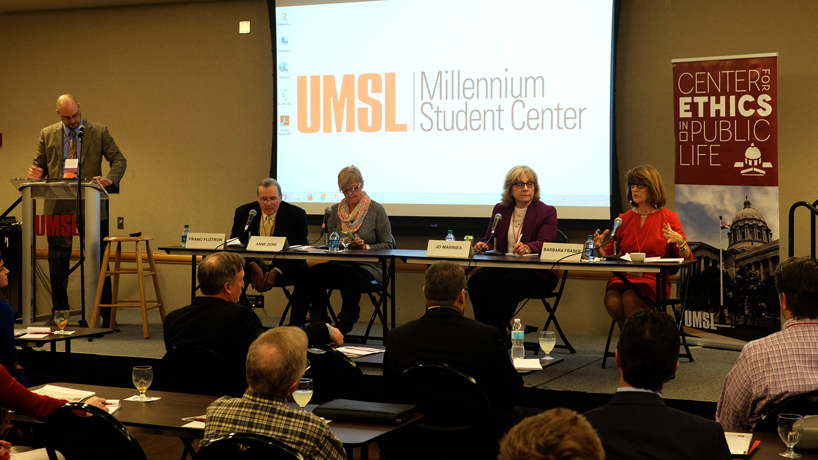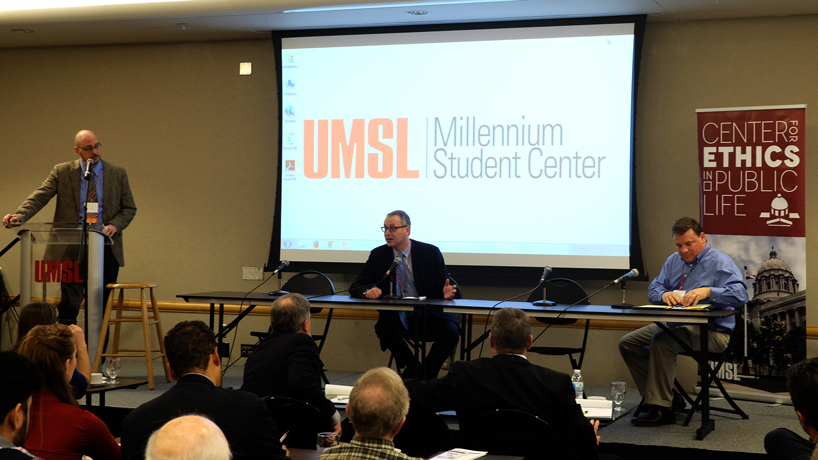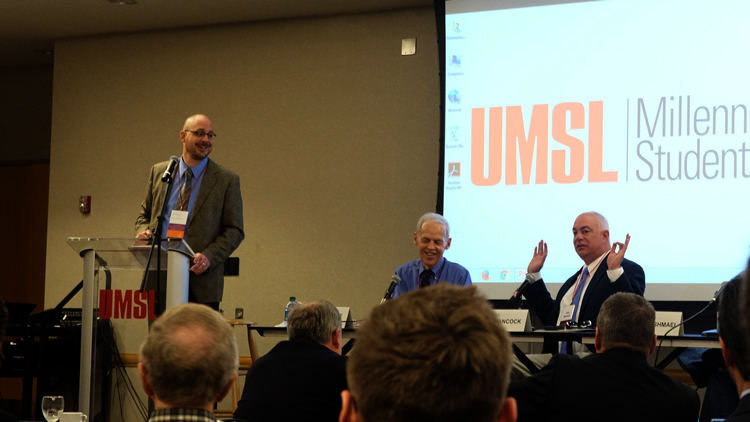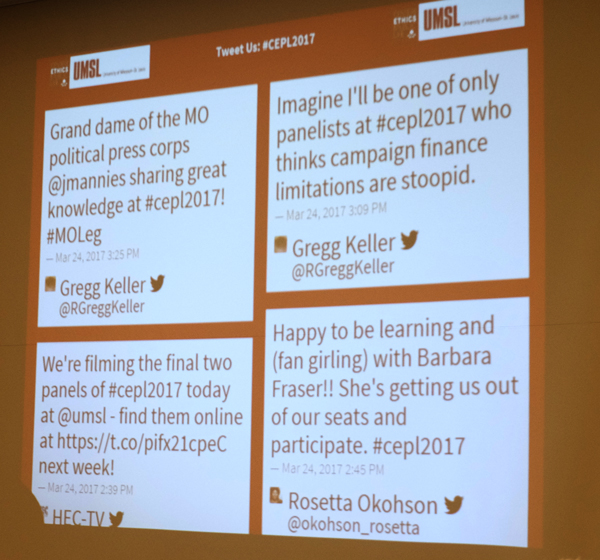
Former four-term state Rep. Barbara Fraser (far right) speaks during a panel on “Operating Ethically in Today’s Political Finance Climate” during a March 24 Conference on Ethics, Money & Politics put on by the Center for Ethics in Public Life at the Millennium Student Center. Wally Siewert (far left) moderated the event, and (from left) Franc Flotron, Anne Zerr and Jo Mannies joined Fraser on an afternoon panel. (Photos by Steve Walentik)
There was one point Wally Siewert made sure to stress right off the bat March 24 as he opened a conference titled “Ethics, Money & Politics” at the University of Missouri–St. Louis.
“For better or for worse, in the modern American political system, money is a necessity,” Siewert said from behind a lectern in Century Room A at the Millennium Student Center.
There is no changing that fact.
“It’s the fuel that kind of brings democracy to citizens’ doorsteps,” said Siewert, who serves as the director for UMSL’s Center for Ethics in Public Life. “Everything costs money – staff, research, media, printing, offices, phone lines, travel. No matter how idealistic the candidate, they’re going to need money to run their campaign.
“From the donor end, for many people it’s the only form of political influence they have.”
Of course, it can also have a corruptive effect on lawmakers and highlight inequality in politics while breeding the heightened levels of partisanship currently on display around the country. All those things can poison the democratic process.
It’s precisely those concerns that have spurred cries for campaign finance reform.
Those cries have only grown louder in the seven years since the Supreme Court’s 5-4 decision in Citizens United v. Federal Election Commission that held that freedom of speech prohibited the government from restricting nonprofit corporations from making independent political expenditures.
The principles in the case have since been extended to for-profit corporations and labor unions among other associations, and there’s been a new wave of money flooding elections since.

Richard Hasen (center), a professor of law and political science at the University of California, Irvine, and Jeffrey Milyo (right), a professor of economics at the University of Missouri–Columbia, laid out different sides of the campaign finance reform debate in the conference’s first session.
Richard Hasen, the Chancellor’s Professor of Law and Political Science at the University of California, Irvine, and Jeffrey Milyo, professor of economics at the University of Missouri, used the day’s first session to lay out the different sides of the debate.
Hasen, author of the 2016 book “Plutocrats United: Campaign Money, the Supreme Court and the Distortion of American Elections,” made an argument for reform, noting that the problems that can arise from money in politics go beyond straightforward corruption.
“Money skews public policy even if it doesn’t buy elections,” Hasen said.
He noted that 158 out of 120 million American families donated roughly half of the money spent on the 2016 presidential election and used that fact to highlight the undue influence held by a few individuals.
Milyo, a skeptic of campaign finance reform, said he has a difficult time talking about undue influence when it comes to elections because he has not heard anyone define “due” influence.
“My point is certainly not that money doesn’t matter and that it’s pointless to advocate,” Milyo said.
He also doesn’t believe reforms usually work the way reformers intend them because the world is more complex than the theoretical framework in which they’re constructed.
Later sessions moved the discussion away from theory and looked closer at the real-world needs for and impact from reform.
A panel featuring Wayne Goode, a five-time state senator, former UM System curator and one of UMSL’s founding fathers, along with UMSL alumnus, two-term state representative and chair of the Missouri Republican Party John Hancock explored “Campaign Finance Reform: Missouri, Past, Present & Future.” They were joined by Patrick Ishmael, the director of government accountability at the Show-Me Institute, and Sean Nicholson, the former founding director of Progress Missouri, now a senior content strategist at GPS Impact.

UMSL alumnus John Hancock (right), the former chair of the Missouri Republican Party, joins Wayne Goode (center) on a panel focused on campaign finance in Missouri. Hancock argued that there is no perfect system to fund political campaigns but the quest to create one has brought unintended consequences.
“It is my contention that in our unending quest to find the perfect way to fund campaigns, we’ve really mucked things up,” Hancock said. “I come at this from the premise that there is no perfect system to fund political campaigns. I don’t think public financing is an ideal option. I don’t think unlimited donations is an ideal option. But I also think that a system that externally enforces ethical behavior on people – it doesn’t work, it hasn’t worked and it won’t work.”
Hancock also believes existing laws have created more problems than intended by taking influence away from political parties.
But some elected officials actually appreciate having the sort of guidelines created by certain campaign finance laws as they make decisions to avoid conflicts of interest.
“I don’t mind it written down,” said former four-term state Rep. Anne Zerr, who took part in one of two afternoon panel discussions recorded by HEC-TV. “I just want to follow the rules.”
There was universal agreement from Zerr, former two-term state Senator-turned-lobbyist Franc Flotron, former four-term state Rep. Barbara Fraser and St. Louis Public Radio political reporter Jo Mannies about the need for disclosure of where money in politics originates.
Still, issues of campaign finance are not universally viewed as the biggest threat to effective governance.

A tweet wall offered attendees a way to participate in the campaign finance reform discussion throughout the day.
Several panelists throughout the day pointed to the weakened financial state of journalism, making it more difficult to expose corruption and hold legislators accountable.
Flotron expressed concern too that in Missouri – and in many other parts of the country – the majority of district elections are now decided in primaries. The districts themselves have become so partisan that one party is unable to mount a real challenge.
“Campaign finance needs to be addressed, but that’s not what I stay awake at night over,” Flotron said.
That didn’t make the conference any less valuable for those in attendance.
“I’ve appreciated all the multiple perspectives,” said Josh Rathje, a student in UMSL’s Master of Public Policy Administration Program. “I think we’ve set up an interesting way of handling different sides of the issue. The debate hasn’t been very raucous or anything. It’s been very informative.”
“Going into this, I was one of those people that said, ‘Oh, there’s too much money – or too much big money – in politics,’” said Scott O’Brien, a doctoral student pursuing a degree in international relations. “Just ethically, it seemed wrong to me on some level. I think knowing more about it is a great thing, and now, when I go out of here, I’m going to be able to apply that to when I read the news or it comes up in discussion. I feel like I’ll have a little more educated opinion.”
Media coverage:
HEC-TV: Panel on “Operating Ethically in Today’s Political Finance Climate: Electeds and Lobbyists”
HEC-TV: Panel on “Operating Ethically in Today’s Political Finance Climate: Fundraisers and Operatives”















